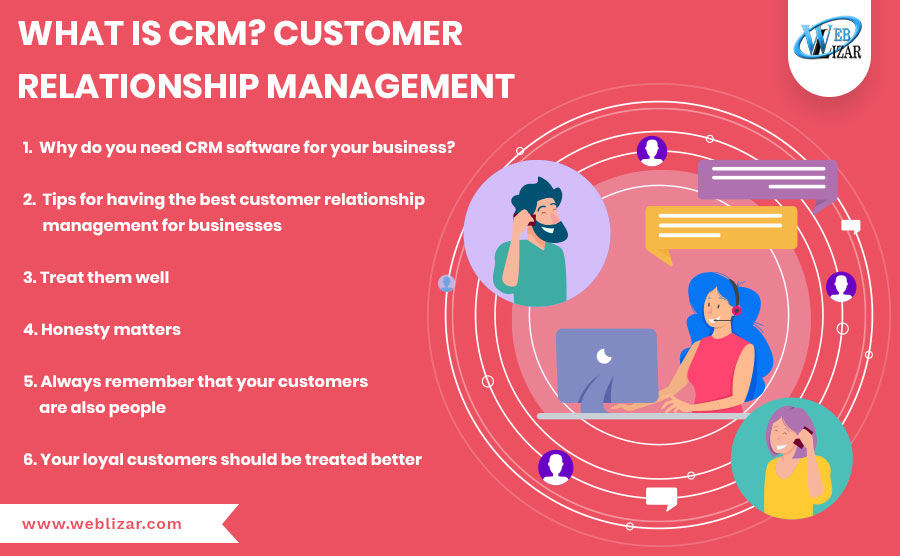Customer Relationship Management (CRM), also known as customer address practices, principles, and guidelines required by an organization while interacting with all customers. If you see this from an organizational perspective, the whole relationship will encompass interactions with all customers.
This includes service and sales-related processes, analysis of behaviors, and customer trends. CRM works wonderfully when it comes to improving the customer’s experience overall. Some of the biggest growth areas regarding CRM technology include cloud computing, artificial intelligence, software, and more. It is also useful when it comes to external customer relationships.
Why do you need CRM software for your business?
Customer Relationship Management (CRM) in all business software entitles individuals and teams to help improve all customer relationships with the best sales efforts and communications. It also builds the best relationships and delivers the best customer experience when it comes to meeting demands easily. CRM can also be customized to meet requirements that differ from one organization to the other.
It also manages many processes within a business. This also includes navigation buttons, fields, and unique modules. It also tracks and improves conversion opportunities. So that you can understand and examine all the possibilities needed to take your work and business to the next step. What is CRM? Customer Relationship Management.
Also Read: 9 Techniques to Optimize Your Company’s Customer Acquisition Process
Best customer relationship management for businesses
1. Treat them well
When it comes to finding success in any business, you must understand how your relationship can have an impact on your clients. For example, you own a business but at the same time, you also purchase products, services, and commodities from others.
How would you want to be treated by them or how do others want to be treated according to you? When you begin to engage with your customers. Focus on the fact that you will have to offer them the same kind of service and respect that you would ideally expect if you happened to be the customer.
2. Honesty matters
When it comes to running a business, it is better, to be honest, and straightforward about everything. Since you will be benefiting majorly from all the services and products, it is advisable, to be honest from the start. Being dishonest will just spoil your reputation. You will end up losing valuable customers.
Not only that, their bad experiences will harm your business. Customers always like it when you are honest with them so make sure that you inform them from before instead of simply leading them on.
Also Check: 3 Tips to Manage Employees & Boost Customer Satisfaction in the Remote Work Era
3. Always remember that your customers are also people
Several businesses tend to lump their customers altogether. For them, customers are just another number or just a means to an end. Nobody likes to be treated like they are a random number. When you begin to build a relationship with your client, don’t just remember what their names are but also remember some facts about them. Remember something similar.
Always remember to use such details to personalize your services. Your customers will love you even more for that.
Your loyal customers should be treated better
All your customers must receive the same respect from your business. However, the rules can differ for loyal or old customers. After all, your customers are the only people who will stick by you through bad and good times. A great way to do this is by sending them birthday gifts on special occasions, thank you notes, and more.
This will impress them. You could also bring in a lot of business while taking advantage of the best advertising services.
Add more value
Your clients will offer you suggestions and tips on various occasions. You can accept this with a smile but make sure there is no follow-up from your end. This could go against you. Instead of ignoring any feedback. Use it to add more value to services and products.
The clients will certainly be happy that your advice was followed and you will be able to take care of their needs in a better way. In short, you will have a stronger relationship with them, which is your real goal.
Also Check: 5 Powerful Strategies to Retain eCommerce Customers
Have timely, regular, and relevant communications
It doesn’t matter what industry you are working in. What the size of the business is, the impact will always be the same. Like most relationships, it is important to communicate and be regular in understanding each other better. It is not a good idea to constantly spam all your customers with offers they don’t like. What is CRM? Customer Relationship Management.
Instead, make sure that you send messages that are tailored and personalized based on all your preferences. Is it wise to use this data to check what would work in a better way for them?
As shown above. Customer Relationship Management (CRM) plays a big role when it comes to improving customer satisfaction. Having a good solution also gives you needed insights into your customer behavior that can be used to make modifications in all business operations.
FAQs”
What is the role of customer relationship management CRM )?
The role of Customer Relationship Management (CRM) is to help businesses manage interactions with current and potential customers. It involves organizing, automating, and synchronizing sales, marketing, customer service, and technical support.
What are the 3 types of CRM?
1. Operational CRM focuses on automating customer-facing processes like sales and service. 2. Analytical CRM involves analyzing data to understand customer behavior and preferences. 3. Collaborative CRM emphasizes communication and cooperation across departments to improve customer relationships.
What is customer relationship management or CRM?
Customer Relationship Management (CRM) is a strategy and technology used by businesses to manage interactions with current and potential customers. It involves organizing, automating, and, marketing, customer service, and support activities to enhance customer satisfaction and ultimately drive profitability.

